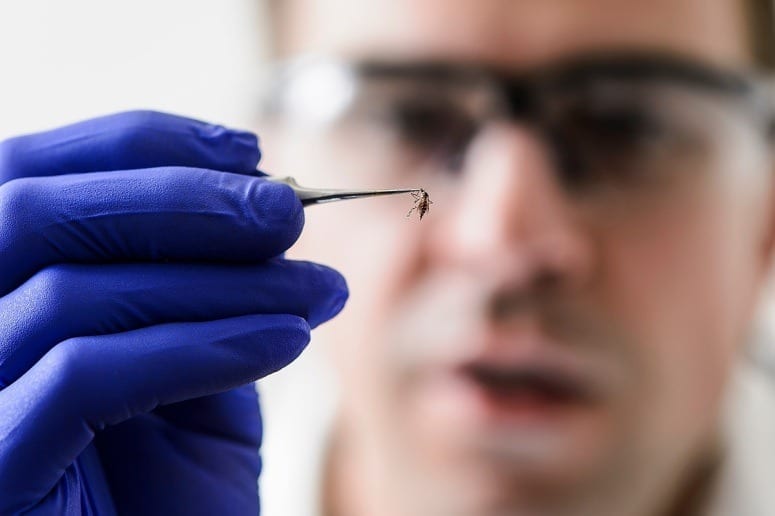
University of Virginia scientists have demonstrated that neurons in the brain that have been supplemented with a synthetic gene can be remotely manipulated by a magnetic field. The finding has implications for possible future treatment of a range of neurological diseases, such as schizophrenia and Parkinson’s disease.
“We may have discovered a major step toward developing a ‘dream tool’ for remotely controlling neural circuits, by manipulating specific cells using engineered gene products that respond to magnets,” said Ali Deniz Güler, a UVA biology professor who led the study in his neuroscience lab.
The finding is published online this week in the journal Nature Neuroscience.
Güler and UVA neuroscience Ph.D. candidate Michael Wheeler engineered a gene that can make a cell sense the presence of a magnetic field. They coupled a gene that senses cellular stretch with another gene that functions as a nanomagnet. This synthetic combination turns on only when in the presence of a magnetic field, allowing them to control neuronal activity in the brain.
“We wanted to activate with magnetism a specific set of neurons in the brain responsible for pleasure,” Güler said.
Using gene therapy to insert the gene, they expressed the synthetic gene in adult mice or in zebrafish embryos, and witnessed remote activation of neurons the presence of a magnetic field through the altered behavior of the animals.
“We have validated that we can turn on cells in the brain with simple magnets, something that has not been achieved before,” Güler said. “We are actually magnetically evoking behavioral responses in animals by creating a cell that can sense magnetic fields. This could pave the way toward eventually treating neurological diseases through magnetism. It is precise and noninvasive.”
Güler and Wheeler call their synthetic gene “Magneto,” after a Marvel Comics cartoon character who can alter magnetic fields.
In a series of tests on mice that had the Magneto gene used to express comfort or pleasure, the mice voluntarily went to a chamber of their cage where the magnetic field was present, similar to going there as if food was present. Likewise, when the magnetic field was turned off, the mice did not display any particular preference for that area of the cage. But when the magnetic field was turned back on, they again moved to that area of the cage.
Mice without the Magneto gene did not display any behavioral changes in the presence of magnets.
“The mice were hanging out in the magnetic chamber because they were experiencing some pleasure there, since we were remotely turning on the neurons that signal reward,” Wheeler said.
In the team’s studies on zebrafish embryos, the embryos responded to a magnetic field by twirling, which they generally do in response to pressures in the water. When the magnetic field was removed, the embryos greatly reduced their twirling behavior.
“These response behaviors, in two separate species of animals, validate that the cells containing the synthetic gene turn on in a magnetic field,” Wheeler noted. “This field can penetrate the brain regardless of tissue density – like MRI – and can turn on specific circuits at a specific time, whenever the test subject is within the magnetic field.”
Güler added, “If we can use gene therapy to exert control over neurons, the potential exists to modify or eliminate the effects of certain neurological diseases by controlling ill-firing neural networks. Our method may be one possible approach.”
He emphasized, however, that at present the method is being used to better understand brain development, function and pathology.
Learn more: UVA SCIENTISTS USE SYNTHETIC GENE AND MAGNETS TO ALTER BEHAVIOR OF MICE, FISH
The Latest on: Remotely controlling neural circuits
[google_news title=”” keyword=”remotely controlling neural circuits” num_posts=”10″ blurb_length=”0″ show_thumb=”left”]
via Google News
The Latest on: Remotely controlling neural circuits
- Parkinson's Newson May 8, 2024 at 5:00 pm
30, 2024 — Researchers have found a way to better control the preclinical generation ... 2023 — Researchers have identified a new neural circuit in the brain which produces a strong sense ...
- 3D video conferencing tool lets remote user control the viewon May 6, 2024 at 2:05 pm
Collaborating on a physical object when two people aren't in the same room can be extremely challenging, but a new remote conferencing system allows the remote user to manipulate a view of the scene ...
- What is TMS Therapy for Anxiety? A Complete Guide by The Best TMS Center Near Meon April 19, 2024 at 6:12 am
Anxiety refers to the foresight of a future concern and is more associated with muscle tension and avoidance behavior.
- New technique connects lab-grown "neural organoids" to resemble brain circuitson April 9, 2024 at 5:00 pm
The ability to study lab-grown human neural circuits will improve our knowledge of how these networks form and change over time in different situations, and may lead to improved treatments for ...
- The neural control of micturitionon October 21, 2023 at 2:43 pm
Thus, many of the neural circuits that are involved in bladder control have switch-like or phasic patterns of activity, unlike the tonic patterns that are characteristic of the autonomic pathways ...
- Brain tumors are cognitive parasites – how brain cancer hijacks neural circuits and causes cognitive declineon June 10, 2023 at 10:21 am
In our recently published research, we found that tumors can not only remodel neural circuits, but that brain ... the tumors had infiltrated quite remote from known language zones of the brain ...
- The Causes of Anxietyon August 29, 2020 at 9:30 am
But it can persist and, by altering the function of neural circuits in the brain, overwhelm the ability to exert rational control ... however remote or hypothetical. Researchers have recently ...
- Neural Circuit Engineering (NCE) Labon October 11, 2017 at 7:12 am
To date, pharmacological treatments and neural implants show promise in generating new synaptic connections; however, neither offers control over where synapses are established. Because a circuit’s ...
- Gesture-Control Tech Set to Replace TV Remote Controlon October 1, 2017 at 5:00 pm
You may soon be able to change the channel by lifting your cat or replay the game-winning touchdown by sticking your left elbow out, with new gesture-control technology that uses objects or users’ ...
- Remotely Controlling A Not-So-Miniature Hot Air Balloonon May 7, 2017 at 1:35 am
Remote control is minimal; just as in a full-size balloon, all the pilot can really do is turn the burner on or off. [Matt]’s approach is a high-torque RC servo to control the burner valve ...
via Bing News











